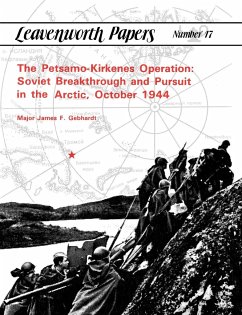Half a century after the end of World War II, many of the important battles of the Eastern Front have not been thoroughly researched by Western military historians. Major James F. Gebhardt, a Soviet foreign area officer, describes a battle that has remained virtually unknown in the English-speaking world. The Petsamo-Kirkenes Operation has remained obscure partly because it was fought on the northern flank of the Soviet German front - away from major centers of population, industry, or government. The German and Soviet generals who fought this battle are also not as well known to the American officer corps as the more famous and fashionable Guderian, Rommel, Manstein, or Zhukov. In Western general histories of the Soviet-German war, this operation normally receives one or two sentences and a single, minuscule map arrow - if it is mentioned at all. The comprehensive accounts of the battle that do exist are principally in Russian-language sources and, therefore, are inaccessible to most Western-readers. Primarily using Soviet sources, Major Gebhardt has written a comprehensive study of the 1944 Soviet offensive conducted to clear German forces from the approaches to Murmansk. Its focus is at the operational level of war, with emphasis on the peculiar demands of arctic terrain on commanders and soldiers. Major Gebhardt also used German war diary reports to add clarity and perspective to the Soviet accounts.This book contains something for almost every reader. It describes the employment on arctic terrain of light infantry, infantry, armor, artillery, engineers, logistic support, air power, naval infantry (Soviet marines), amphibious forces, and special-purpose forces. In three weeks of often intense fighting, supported by units of the Northern Fleet, the Red Army inflicted significant personnel and material losses on the German force and drove it from Soviet and northern Norwegian territory. This operational account provides the opportunity to review the lessons








